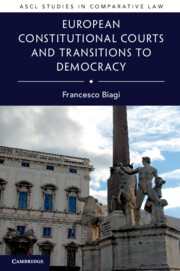Book contents
- European Constitutional Courts and Transitions to Democracy
- ASCL Studies in Comparative Law
- European Constitutional Courts and Transitions to Democracy
- Copyright page
- Dedication
- Contents
- Foreword
- Acknowledgments
- Notes on the Text
- Introduction
- 1 Democratic Transitions and Constitutional Courts
- 2 The First Generation
- 3 The Second Generation
- 4 The Third Generation
- 5 Comparing Three Generations
- Bibliography
- Index
Introduction
Published online by Cambridge University Press: 05 December 2019
- European Constitutional Courts and Transitions to Democracy
- ASCL Studies in Comparative Law
- European Constitutional Courts and Transitions to Democracy
- Copyright page
- Dedication
- Contents
- Foreword
- Acknowledgments
- Notes on the Text
- Introduction
- 1 Democratic Transitions and Constitutional Courts
- 2 The First Generation
- 3 The Second Generation
- 4 The Third Generation
- 5 Comparing Three Generations
- Bibliography
- Index
Summary
What is the relationship between transitions to democracy and constitutionalism? What role have constitutional courts played in the past in democratization processes? What “lessons” can be drawn from these experiences by countries – such as those involved in the “Arab Spring” – that are currently undergoing a transition from an authoritarian rule? These are some of the key questions this book addresses. Transitions to democracy, on the one hand, and constitutional justice, on the other, are topics that, each in its specific domain, have been the subject of numerous in-depth studies. Transition processes, especially in the early phases, have been analyzed mainly by historians, political scientists, sociologists, philosophers, and economists, and only at a later stage did legal scholars (particularly constitutional law scholars) start to examine these processes.
- Type
- Chapter
- Information
- Publisher: Cambridge University PressPrint publication year: 2020

